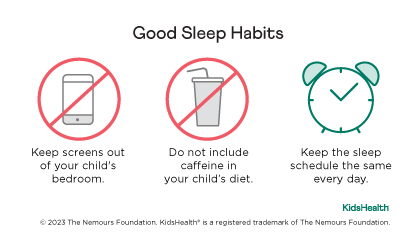Sleep is important for children's growth, development, and overall health. Help your child develop good sleep habits early so they can get the sleep they need.


Keep the sleep schedule the same every day. Set regular bedtimes and wake-up times for your child. On weekends, try to stick to the sleep schedule as close as you can. Aim for sleep or wake-up times no more than an hour later than on weekdays.
Create a relaxing bedtime routine for your child. At bedtime, remind your child that it's time to be quiet and go to sleep. A bedtime routine should take about 30 minutes and can include going to the bathroom, brushing teeth, and quiet activities like reading or listening to soothing music.
Keep the bedroom quiet and restful. Do not let your child keep computers, tablets, cellphones, TVs, or video game systems in the bedroom. Turn off all devices at least an hour before bedtime. You can try a white noise machine, electric fan, or soft music if noise from outside the room keeps your child awake.
Encourage habits during the day that help your child get better sleep at night. Don't give your child food or drinks with caffeine (found in coffee, tea, sodas, and chocolate), especially in the late afternoon and evening. Make sure your child gets plenty of physical activity, such as sports and outdoor play, during the day. This helps kids burn off excess energy, which can make them tired and can help them fall asleep more quickly and sleep better.


How much sleep does my child need? Although it can vary, most kids 6–12 years old need about 9–12 hours of sleep each night.
What can happen if my child doesn't get enough sleep? Kids who don't get enough sleep may be cranky or moody or have behavior problems. They may have trouble learning and paying attention in school.
How can I tell if my child isn't getting enough sleep? A child who isn't getting enough sleep may:
What can I do if my child is getting up throughout the night? If your child wakes up or gets scared in the night, offer them comfort, then help them get back into their bed so that they can fall back asleep on their own.